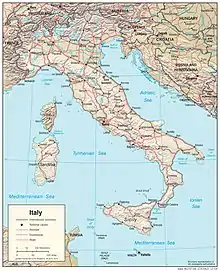Italy
English

Map of Italy.
Etymology
From Middle English Italy, Italie, from Old English Italia (“Italy”), from Latin Italia (“Italy”), via Ancient Greek Ῑ̓ταλίᾱ (Ītalíā), from Oscan 𐌅𐌝𐌕𐌄𐌋𐌉𐌞 (víteliú). Usually explained as a cognate of vitulus (“calf”), thus meaning "land of young bulls" in Oscan. In that case, ultimately from Proto-Indo-European *wet- (“year”). According to some ancient Greek authors, named after a king Italus or Italos, whose kingdom was on the peninsula.
Pronunciation
- IPA(key): /ˈɪtəli/
- (General American) IPA(key): [ˈɪ.ɾə.li]
- (Standard Southern British) IPA(key): [ˈɪ.tə.li]
- (Ghanaian) IPA(key): [ˈi.tɐ.li]
Audio (US) (file)
Proper noun
Italy
- A country in Southern Europe. Official names: Italian Republic and Republic of Italy. Capital and largest city: Rome.
- 1868, E. S. G. S., Italy and her capital, page 170:
- Rome is the heart of Italy [...]. She was, is, and must ever be, her capital.
- 19th century, Thomas Hodgkin, Italy and her invaders, title:
- Italy and her invaders
- Synonym of Apennine Peninsula
Meronyms
country in Southern Europe
Related terms
Descendants
- → Thai: อิตาลี (ì-dtaa-lîi)
Translations
country in southern Europe
|
See also
- (countries of Europe) country of Europe; Albania, Andorra, Armenia, Austria, Azerbaijan, Belarus, Belgium, Bosnia and Herzegovina, Bulgaria, Croatia, Cyprus, Czechia (Czech Republic), Denmark, Estonia, Finland, France, Georgia, Germany, Greece, Hungary, Iceland, Ireland, Italy, Kazakhstan, Latvia, Liechtenstein, Lithuania, Luxembourg, Malta, Moldova, Monaco, Montenegro, Netherlands, North Macedonia, Norway, Poland, Portugal, Romania, Russia, San Marino, Serbia, Slovakia, Slovenia, Spain, Sweden, Switzerland, Turkey, Ukraine, United Kingdom, Vatican City
This article is issued from Wiktionary. The text is licensed under Creative Commons - Attribution - Sharealike. Additional terms may apply for the media files.